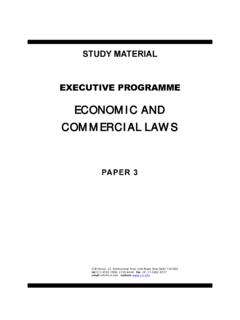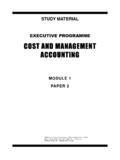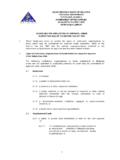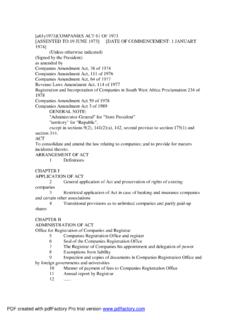Transcription of Highlights of Companies Amendment Bill, 2016
1 Highlights of Companies Amendment bill , 2016 The Companies ( Amendment ) bill , 2016 to further amend the Companies Act as part of efforts to address difficulties faced by stakeholders and facilitate the ease of doing business in the country has been introduced in Lok Sabha on 16th March, 2016 by Hon ble Minister of Finance, Corporate Affairs and Information and Broadcasting Shri Arun Jaitley. The Companies ( Amendment ) bill , 2016 has been framed on the basis of recommendations of Companies Law Committee (CLC), the report of which was submitted by CLC to Hon ble Union Minister of Finance, Corporate Affairs and Information & Broadcasting on February 01, 2016.
2 As per the Statement of Objects and Reasons of the Amendment bill , the proposed changes are broadly aimed at: addressing difficulties in implementation owing to stringent compliance requirements; facilitating ease of doing business in order to promote growth with employment; harmonisation with accounting standards, the Securities and Exchange Board of India Act, 1992 and the regulations made thereunder, and the Reserve Bank of India Act, 1934 and the regulations made thereunder; rectifying omissions and inconsistencies in the Act.
3 Highlights : To address difficulties in implementation Name reservation/approval: There were concerns that the period of sixty days for reservation of name should be from date of approval and not from the date of application. This concern is addressed however, considering the fact that a changed process for centralised processing of name reservation/approval has already been implemented, the period of name reservation is proposed to be reduced to 20 days from sixty days. The specified period for name reservation is proposed from the date of approval and not from the date of application.
4 Registered office of the company: Section 12(1) requires that a company shall, on and from the fifteenth day of its incorporation, and at all times thereafter, have a registered office. This did not allow a company to have its registered office immediately on incorporation, or earlier than the fifteenth day of its incorporation, whereas a company could have its office from the day of its incorporation. Amendment proposed to provide for a company to have its registered office within the given period of incorporation of company. Further, the period of fifteen days is increased to thirty days.
5 There were difficulties with regard to filing of change of the registered office of a company with the Registrar. The concern was that the period of fifteen days is too short as certain documents like lease deeds, rent agreements and other related documents that are required to be submitted besides various approvals may have to be obtained. Accordingly to address the concerns, it is proposed to be increased to thirty days. Effect of number of members falling below the minimum requirement: Section 3(1) of the Act provides for the minimum number of persons required for formation of a company.
6 However, the minimum number of persons required for continuation of a company after it is formed and legal consequences of number of members falling below the minimum number is not provided in the Act. It is proposed that every person who is a member of the company during the time that it so carries on business after those six months and is cognisant of the fact that it is carrying on business with less than the prescribed number of members shall be severally liable for the payment of the whole debts of the company contracted during that time, and may be severally sued therefor.
7 Deposit Insurance: Considering the fact that none of the Insurance Companies are offering insurance products for covering company deposit default risks, the requirement for deposit insurance is omitted. Re-opening of accounts of Companies : It has not been provided as to for how many years, the books of account of Companies could be reopened. Accordingly, a period of eight years is proposed for reopening of accounts of a company. With this proposed Amendment , Companies would be relieved from the burden of maintaining their accounts forever or beyond a reasonable time limit.
8 Signing of financial statements: Provisions of section 134 require that, amongst others, the financial statement shall be signed by the Chief Executive Officer, if he is a director in the company. The Amendment proposes that the Chief Executive Officer shall sign the financial statements irrespective of whether he is a director or not because Chief Executive Officer is a Key managerial Personnel, and responsible for the overall management of the company. Further, since the appointment of a managing director is not mandatory for all Companies , it is proposed to insert the words if any , after the words managing director.
9 Performance evaluation of Directors: Alignment of provisions of sections 134 (3)(p), 178(2) and schedule IV with respect to performance evaluation of directors. Sections 134 (3)(p) provides for performance evaluation by the Board. Section 178 (2) provides that the Nomination & Remuneration Committee shall carry out evaluation of every director s performance. Schedule IV provides that: a) the independent directors shall review the performance of non-independent directors, the Board as a whole and the Chairperson of the Company; b) the performance evaluation of independent directors shall be done by the entire board of directors, excluding the director being evaluated.
10 With the proposed Amendment , the provisions of the sections would be harmonised. It is proposed that the Nomination & Remuneration Committee shall specify the manner for effective evaluation of performance of Board, its committees and individual directors to be carried out either by the Board, by the Nomination and Remuneration Committee or by an independent external agency and review its implementation and compliance. Corporate Social Responsibility: Definition of any financial year Section 135 is applicable to Companies which falls within the threshold of specified net worth or turnover or net profit and are required to constitute the CSR Committee in any financial year.












